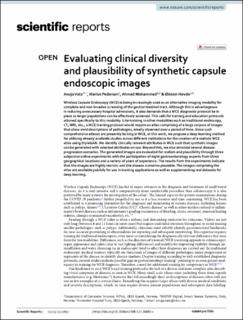| dc.contributor.author | Vats, Anuja | |
| dc.contributor.author | Pedersen, Marius | |
| dc.contributor.author | Mohammed, Ahmed Kedir | |
| dc.contributor.author | Hovde, Øistein | |
| dc.date.accessioned | 2023-11-15T09:54:33Z | |
| dc.date.available | 2023-11-15T09:54:33Z | |
| dc.date.created | 2023-08-24T09:53:44Z | |
| dc.date.issued | 2023 | |
| dc.identifier.citation | Scientific Reports. 2023, 13 (1), . | en_US |
| dc.identifier.issn | 2045-2322 | |
| dc.identifier.uri | https://hdl.handle.net/11250/3102665 | |
| dc.description.abstract | Wireless Capsule Endoscopy (WCE) is being increasingly used as an alternative imaging modality for complete and non-invasive screening of the gastrointestinal tract. Although this is advantageous in reducing unnecessary hospital admissions, it also demands that a WCE diagnostic protocol be in place so larger populations can be effectively screened. This calls for training and education protocols attuned specifically to this modality. Like training in other modalities such as traditional endoscopy, CT, MRI, etc., a WCE training protocol would require an atlas comprising of a large corpora of images that show vivid descriptions of pathologies, ideally observed over a period of time. Since such comprehensive atlases are presently lacking in WCE, in this work, we propose a deep learning method for utilizing already available studies across different institutions for the creation of a realistic WCE atlas using StyleGAN. We identify clinically relevant attributes in WCE such that synthetic images can be generated with selected attributes on cue. Beyond this, we also simulate several disease progression scenarios. The generated images are evaluated for realism and plausibility through three subjective online experiments with the participation of eight gastroenterology experts from three geographical locations and a variety of years of experience. The results from the experiments indicate that the images are highly realistic and the disease scenarios plausible. The images comprising the atlas are available publicly for use in training applications as well as supplementing real datasets for deep learning. | en_US |
| dc.language.iso | eng | en_US |
| dc.publisher | Springer Nature Ltd. | en_US |
| dc.rights | Navngivelse 4.0 Internasjonal | * |
| dc.rights.uri | http://creativecommons.org/licenses/by/4.0/deed.no | * |
| dc.title | Evaluating clinical diversity and plausibility of synthetic capsule endoscopic images | en_US |
| dc.title.alternative | Evaluating clinical diversity and plausibility of synthetic capsule endoscopic images | en_US |
| dc.type | Peer reviewed | en_US |
| dc.type | Journal article | en_US |
| dc.description.version | publishedVersion | en_US |
| dc.source.volume | 13 | en_US |
| dc.source.journal | Scientific Reports | en_US |
| dc.source.issue | 1 | en_US |
| dc.identifier.doi | 10.1038/s41598-023-36883-x | |
| dc.identifier.cristin | 2169234 | |
| cristin.ispublished | true | |
| cristin.fulltext | original | |
| cristin.qualitycode | 1 | |

